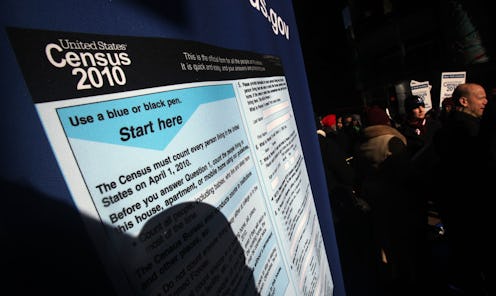News
What You Need To Know About The Trial For Trump's U.S. Census Citizenship Question

While the ongoing partial government shutdown has left the Department of Justice without its main source of federal funding, it won't keep the agency out of court. A trial challenging the Trump administration's decision to add a citizenship question to the 2020 U.S. Census will begin Monday in San Francisco, California. This will be the second trial to challenge the census question.
Late last month, U.S. District Judge Richard Seeborg denied the Justice Department's motion to delay the trial until a partial government shutdown, which began Dec. 22, was over and funding had been restored to the agency, The San Francisco Chronicle has reported. Judge Seeborg will now begin to hear arguments in a lawsuit brought against the Trump administration by both the state of California collectively and a number of California cities.
According to the Associated Press, they've argued that the Trump administration's decision to add a citizenship question to the 2020 Census is politically motivated. What's more, they've claimed it would result in an "undercount" that could ultimately affect states and cities' federal funding and congressional representation as immigrants and Latinx people would likely be discouraged from participating in the Census due to the question.
"They're saying effectively this is a poison pill to the count for the purposes of depressing the count," NPR has previously quoted Judge Seeborg as having said in summary of the plaintiff's general argument.
The Trump administration, however, has argued that Census officials actively work to prevent undercounts and ensure accuracy through in-person follow-up household visits. What's more, the Associated Press has reported that the Justice Department told the court that households who opt not to answer the citizenship question but who still answer a majority of the Census' questions will be counted.
Still, California and other plaintiffs have alleged that the addition of a citizenship question was a strategic move by Trump administration officials. In court documents, California claimed "that [Commerce Secretary Wilbur Ross] was motivated to add the citizenship question for the partisan purpose of facilitating the exclusion of non-citizens from the population count for congressional apportionment," the Associated Press has reported.
This isn't the first time the Trump administration's attempt to add a citizenship question to the U.S. census has gone before a federal judge. In November, U.S. District Judge Jesse M. Furman heard arguments in a similar trial, which was held in New York. His ruling is expected to come any day now.
In that trial, pre-trial documents revealed that Ross discussed the citizenship question with Steve Bannon, then the White House chief strategist and adviser, as well as Kris Kobach, the Kansas secretary of state who, at the time, was vice chairman of the Trump administration's voter fraud commission. According to The Washington Post, pre-trial documents proved that Ross had actually been pushing to have a citizenship question added to the Census long before the Commerce Department claimed, in March, that the Department of Justice had requested its addition to the Census.
At the time, the Commerce Department claimed the Justice Department felt the question would enable better enforcement of the Voting Rights Act of 1965.